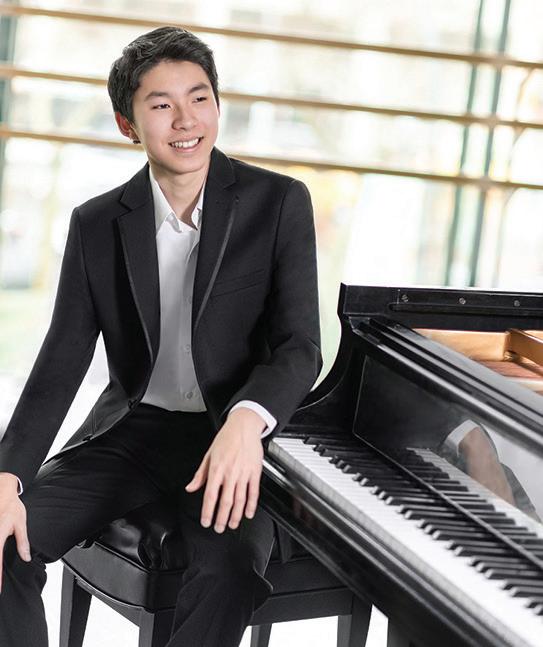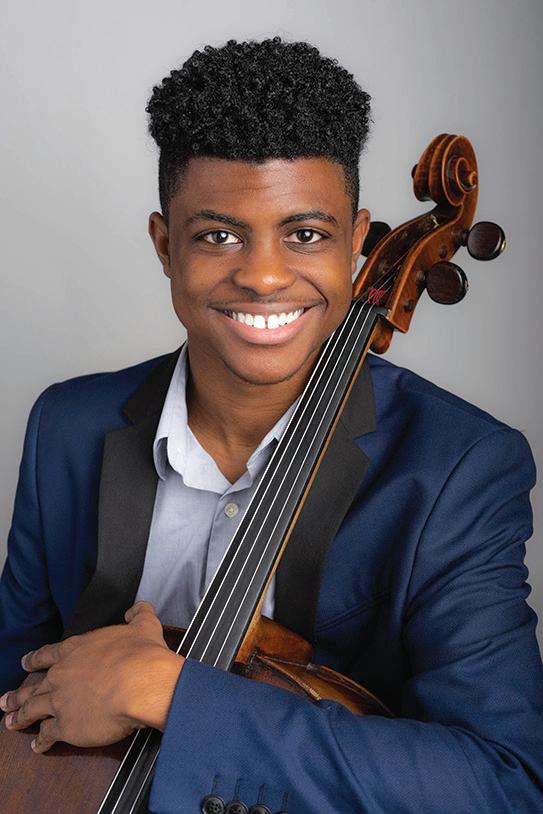
4 minute read
Rising Stars: James Carder

Rising Stars to Perform at Ebenezer Theater
by James Carder
Pianist Elliot Wuu and cellist Sterling Elliott will perform music by Beethoven, Schubert, Schumann, Saint-Saëns and Tchaikovsky at the Ebenezer Theater, 17 S. Washington St., Easton, at 2 p.m. on Sunday, February 13. This Rising Stars concert is part of Chesapeake Music’s Interlude Series and will also be streamed for a week following the live performance. The program the two young musicians have created is as follows:
Robert Schumann, “Kinderszenen,” Op. 15, Elliot Wuu
Franz Schubert, “Wanderer” Fantasy (Fantasie in C Major), Op. 15, Elliot Wuu
Ludwig van Beethoven, “Cello Sonata No. 4” in C Major, Op. 102, no.1, Sterling Elliott and Elliot Wuu
Pyotr Ilyich Tchaikovsky, “Andante cantabile” [arr.], Sterling Elliott and Elliot Wuu
Camille Saint-Saëns, “Havanaise in E Major,” Op. 83 [arr.], Sterling Elliott and Elliot Wuu
Despite the time pressures of their classes at The Juilliard School and a busy concert schedule, Elliot and Sterling recently discussed their upcoming Easton performance.
Why have you chosen this program, and why do you enjoy the music and composers you have chosen?
Elliot: “I’ve put the ‘Kinderszenen’ and the ‘Wanderer’ Fantasy on a personal pedestal ever since I

Pianist Elliot Wuu
was a small child. In my opinion, they’re one of the most musical (Schumann) and technically challenging (Schubert) works of each respective composer. During the pandemic, we all had extra time on our hands ~ oddly, sometimes more than we could fully utilize. Rather than being locked up in a practice room and treasuring every hour I have left in a day, the extra time allowed me to go outside and take long walks in my neighborhood back home and in Central Park in New York. It allowed me to have more self-reflection about

Cellist Sterling Elliott not only my current life but also my childhood.
“During this reflection, I thought about the Schumann piece because I could relate to some of the movements (pleading child, happy enough, at the fireside, etc.). ‘Kinderszenen,’ or ‘Scenes from Childhood,’ is an introspective and intimate perspective of childhood through the lens of Schumann. His poetic sensibility captures the innocent and naive childhood in thirteen short pieces, weaving through inspirations of dreams, playful games and memories. “As for Schubert, I really wanted to challenge myself. Right before the pandemic, I heard a live concert at Carnegie Hall with Korean pianist Seong-jin Cho performing this piece, and I was completely inspired. Performing this work is almost like running a marathon because even though there are four movements, Schubert wrote connecting transitions, so the piece is to be played without a break. The magnitude of the work really brings both the pianist and the listener through a complete spectrum of human emotions such as pure joy, nostalgia and alienation from home.”
Sterling: “Our duo selections are not only among my favorites in the cello repertoire, but also some of the best representations of each composer’s individual voice. There are symphonic qualities to each of
the selections, and I am excited with the challenge to tackle such a magnitude with just cello and piano! The Beethoven I find to be a miniature symphonic work, though with the profound intimacy and beautiful intricacies that are usually reserved only for chamber works. The Tchaikovsky is a similar case, as the work was originally composed as the slow movement to his first string quartet, a fitting setting for such a melody to be found, though this movement was later expanded to an orchestral setting. The Saint-Saëns, which was originally composed for violin and orchestra, has been adopted for cello and piano so that Elliot and I will be able to finish our program with this larger-than-life work!”
What would you like the audience to take away from hearing this program?
Elliot: “I think both solo piano works really put a spotlight on human emotion, and both composers try to capture the subtleties of these emotions.”
Sterling: “The Beethoven sonata features his late period peculiarities, mainly these immediate switches between serene and tumultuous tempers, which in turn evoke both soothing and boisterous moods throughout. The Tchaikovsky ‘Andante cantabile’ is a famous tune that epitomizes his ability to write these beautifully sentimental melodies. The final work, the ‘Havanaise,’ is a work imbued with rich Romanticism while displaying feats of virtuosity. I hope for this program to both serenade and fascinate the audience, as well as leave them with an earworm or two!”
What is the most memorable/enjoyable musical experience that you have had to date ~ either your own performance or that of others?
Elliot: “A few years ago, I watched Martha Argerich perform Prokofiev’s 3rd piano concerto at Carnegie Hall. It has always been a dream of mine to watch Argerich play live, especially that concerto in which her recordings are considered legendary. I remember seeing that specific concert on the Carnegie Hall website calendar and seeing that it had been sold out for months. I would periodically check the website in hopes that someone would return their ticket; however, because Argerich had not performed at Carnegie Hall for over a decade, no one would give one up. The morning of the concert, I went to the box office to see if anyone had returned tickets, and thankfully, they had one ticket. It was definitely one of the most expensive tickets I’ve ever purchased ($170) for a single concert, and it wasn’t a great ticket, either (I sat almost at the back of the hall). “Throughout the entire perfor-










